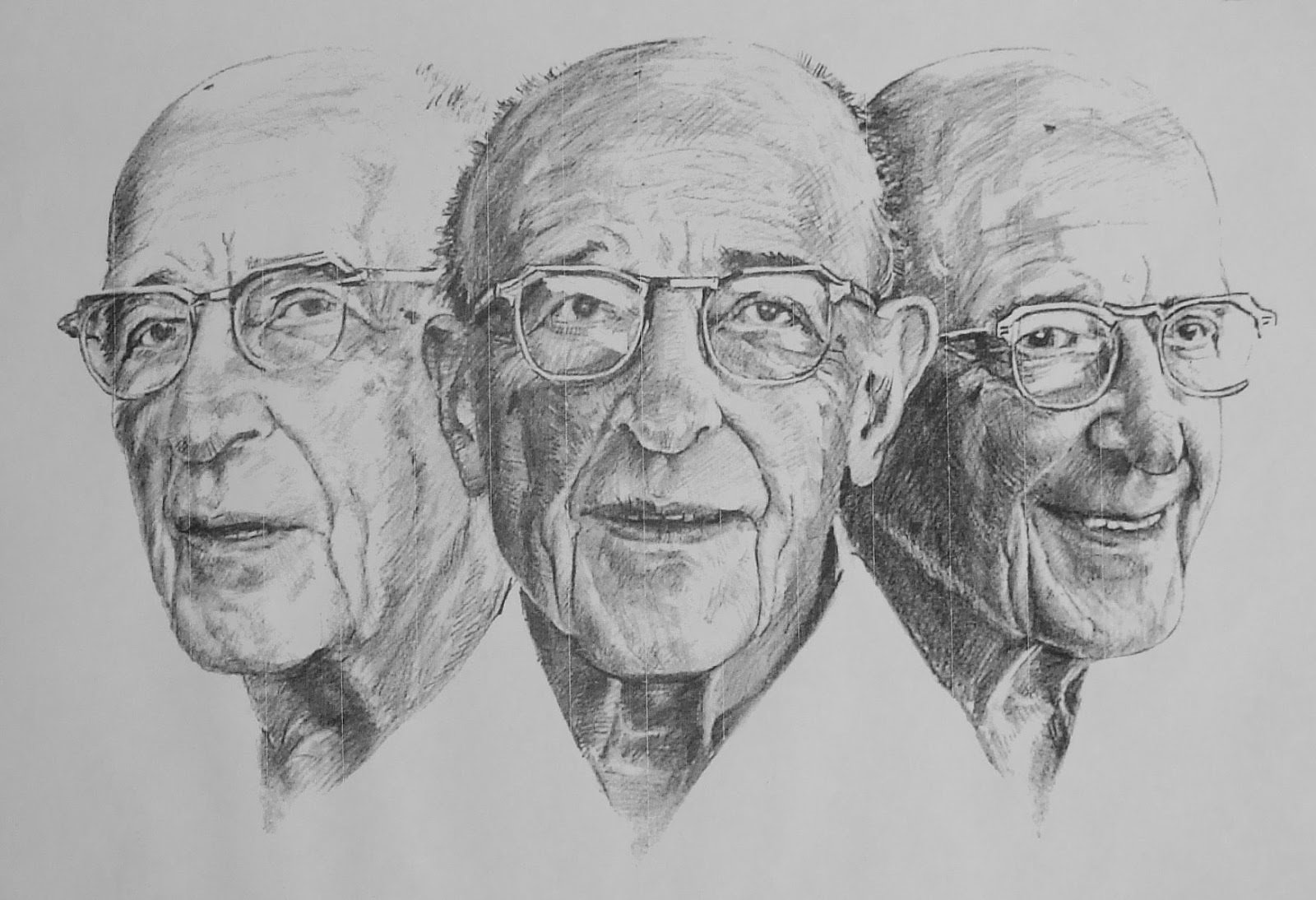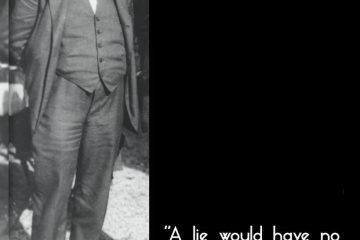
Click below to listen to this article:
Carl Rogers
In this article, we will explore the life and work of Carl Rogers, one of the most influential figures in the history of psychotherapy and humanistic psychology. He pioneered the client-entered approach, which emphasizes the importance of the therapeutic relationship, the client’s autonomy and Self-actualization, and the therapist’s unconditional positive regard, empathy and congruence.
Rogers believed that every person has an innate tendency to grow and fulfil their potential, and that the therapist’s role is to facilitate this process by providing a safe and supportive environment. Rogers also applied his principles to education, social work, conflict resolution and peace initiatives, advocating for a more democratic, compassionate and tolerant world. Some of his famous quotes illustrate his philosophy:
“It is the client who knows what hurts, what directions to go, what problems are crucial, what experiences have been deeply buried.” (Rogers, 1961, p. 11)
“Experience is, for me, the highest authority. The touchstone of validity is my own experience. No other person’s ideas, and none of my own ideas, are as authoritative as my experience.” (Rogers, 1961, p. 23)
“The curious paradox is that when I accept myself just as I am, then I change.” (Rogers, 1961, p. 17)
“People are just as wonderful as sunsets if you let them be.” (Rogers, n.d., as cited in AZ Quotes)
Life history
Rogers was born in Oak Park, Illinois, to a conservative and religious family. He was the fourth of six children and had a close bond with his mother, who was a home-maker. His father was a civil engineer who moved the family to a farm in Wisconsin when Rogers was 12 years old. Rogers enjoyed reading and learning, and he enrolled in the University of Wisconsin to study agriculture, but later switched to history and then to religion. He became interested in psychology after attending a seminar by Alfred Adler, and he decided to pursue a career in clinical psychology. He obtained his M.A. and Ph.D. from Columbia University Teachers College, where he was influenced by John Dewey’s progressive education philosophy and William H. Kilpatrick’s student-centred approach (Britannica, 2023).
Rogers worked as a child psychologist at the Rochester Society for the Prevention of Cruelty to Children, where he developed his client-centred therapy method based on his observations of children’s natural tendency to grow and develop when provided with a supportive environment. He later taught at Ohio State University, the University of Chicago, and the University of Wisconsin, where he established counselling centres and conducted research on psychotherapy outcomes. He also founded the Center for Studies of the Person in La Jolla, California, where he continued his work until his death in 1987. Rogers was one of the founders of humanistic psychology, which emphasizes the positive aspects of human nature and the potential for Self-actualization. He also applied his approach to various fields such as education, parenting, leadership, conflict resolution, and peace (Verywell Mind, n.d.).
Rogers’ life history reflects his thinking in relation to human behaviour and psychology in several ways. First, his upbringing in a strict and religious family may have contributed to his appreciation of individual freedom and autonomy, as well as his rejection of authoritarianism and dogmatism. Second, his exposure to different academic disciplines may have fostered his openness to new ideas and perspectives, as well as his holistic view of human nature. Third, his experience as a therapist and a researcher may have shaped his empirical and pragmatic attitude toward psychology, as well as his emphasis on the subjective experience of the client. Rogers’ approach assumes that humans are inherently good and capable of growth when provided the opportunity to explore their own feelings and values in an accepting and understanding atmosphere (APA, n.d.).
Contribution to our understanding of human behaviour
Carl Rogers made significant contributions to our understanding of human behaviour and psychology through his development of client-centred therapy and his role in the humanistic psychology movement.
Client-centred therapy, also known as person-centred therapy or Rogerian therapy, is a form of psychotherapy that emphasizes the client’s subjective experience, feelings, and values. Rogers believed that the therapist should provide unconditional positive regard, empathy, and congruence to facilitate the client’s Self-actualization and growth. He stated that “the individual has within himself or herself vast resources for self-understanding, for altering his or her self-concept, attitudes and self-directed behaviour – and that these resources can be tapped if only a definable climate of facilitative psychological attitudes can be provided” (Rogers, 1980, p. 115).
Some examples of how Rogers applied his theory to counselling are:
- He used reflective listening to show empathy and clarify the client’s feelings and meanings.
- He avoided giving advice or interpretations, but instead encouraged the client to find their own solutions and insights.
- He used quotes from his own or other clients’ experiences to illustrate his points and show congruence.
Some of Rogers’s most famous quotes illustrate his person-centred approach and his view of human nature. For example, he said: “We cannot change, we cannot move away from what we are, until we thoroughly accept what we are. Then change seems to come about almost unnoticed” (Rogers, 1961, p. 17). He also said: “The more I can keep a relationship free of judgment and evaluation, the more this will permit the other person to reach the point where he recognizes that the locus of evaluation, the centre of responsibility, lies within himself” (Rogers, n.d., para. 2). Another quote that reflects his optimism and respect for human dignity is: “Life is precious and vulnerable, so be wise with how you choose to spend it because once death arrives, there is no turning back” (Rogers, n.d., para. 3).
The influence of Alfred Adler
Alfred Adler was one of the early influences on Carl Rogers, who admired his direct and simple approach to working with clients. Adler emphasized the importance of social interest, which he defined as “a feeling of community, a feeling of belonging, a feeling of being at home on this earth” (Adler, 1938/1964, p. 135). Rogers shared this view of human nature as essentially social and cooperative, and he also adopted some of Adler’s ideas on change, such as the notion that people can modify their self-concept and behaviour through encouragement and positive regard.
However, Rogers also developed his own distinctive theory of personality and therapy, which differed from Adler’s in some aspects. One of the main differences was their understanding of the motivational force behind human behaviour. For Adler, this was the striving for superiority, which he saw as a universal and innate drive to overcome feelings of inferiority and to achieve personal and social goals. Adler believed that this striving could be either healthy or unhealthy, depending on how it was expressed and whether it was guided by social interest or not.
For Rogers, on the other hand, the primary motive of human behaviour was the actualizing tendency, which he defined as “the inherent tendency of the organism to develop all its capacities in ways which serve to maintain or enhance the organism” (Rogers, 1959, p. 196). Rogers argued that this tendency was not a drive or an instinct, but rather a directional process that was present in all living things and that aimed at fulfilling their potential. Unlike Adler’s striving for superiority, Rogers’ actualizing tendency did not imply any comparison or competition with others, but rather an intrinsic and subjective sense of growth and fulfilment.
Another difference between Adler and Rogers was their view of the role of the therapist in facilitating change. Adler advocated for an active and directive style of therapy, in which the therapist would challenge the client’s faulty beliefs, offer interpretations and suggestions, and use techniques such as role-playing and homework assignments. Rogers, in contrast, proposed a non-directive and empathic style of therapy, in which the therapist would provide the core conditions of unconditional positive regard, congruence, and accurate empathic understanding. Rogers believed that these conditions were necessary and sufficient for the client to access their own inner resources and to resolve their own problems.
In conclusion, Alfred Adler had a significant influence on Carl Rogers’ development as a psychologist and a therapist, but they also had some important differences in their theories and methods. Both contributed to the humanistic movement in psychology, which emphasized the positive aspects of human nature and the potential for growth and change.
Widespread influence
His work on person-centred therapy has inspired many other thinkers and theories, such as Abraham Maslow’s hierarchy of needs, Martin Seligman’s positive psychology, and Albert Bandura’s self-efficacy.
The person-centred approach has been adopted widely around the world in various fields and settings, such as education, health care, social work, and conflict resolution. It has also influenced other forms of therapy, such as existential therapy, gestalt therapy, and solution-focused therapy. The person-centred approach continues to be relevant and useful in helping people achieve personal growth and wellbeing.
Founder of Humanism
Humanistic psychology, also known as the third force in psychology, is a perspective that focuses on the human potential for creativity, freedom, and self-fulfilment. Rogers was one of the founders of this movement, along with Abraham Maslow and Rollo May. He challenged the dominant paradigms of behaviourism and psychoanalysis, which he considered to be too deterministic and pessimistic. He advocated for a more holistic and optimistic view of human nature, based on his own clinical experience and research. Rogers wrote that “the most important learning for me has come from my experience with individuals in therapy… I have come to feel that the more fully the individual is understood and accepted, the more he is likely to become increasingly himself” (Rogers, 1961, p. 27).
Psychological terms introduced by rogers
Rogers emphasized the importance of the self and the therapeutic relationship. Some of the psychological terms suggested by Rogers that are now accepted and used in modern psychology are:
The core conditions: These are the three essential elements that a therapist must provide for a client to facilitate positive change. They are empathy (the ability to understand and share the client’s feelings), congruence (the authenticity and honesty of the therapist), and unconditional positive regard (the acceptance and respect of the client without judgment). Rogers believed that these conditions were necessary and sufficient for therapeutic personality change (Rogers, 1957).
He proposed that there are seven stages of process that clients go through in therapy, from being rigid and defensive to being open and flexible.
The self-concept: This is the view that a person has of themselves, which includes their self-image (how they see themselves), their self-esteem (how much value they place on themselves), and their ideal self (the person they aspire to be). Rogers thought that the self-concept was influenced by the feedback and expectations of others, and that a discrepancy between the self-concept and the ideal self could lead to psychological distress. He also proposed that people have a basic need for Self-actualization, which is the fulfilment of their potential (Rogers, 1959).
The humanistic theory of self: This is a broader perspective on human nature that emphasizes the inherent goodness, creativity, and freedom of human beings. Rogers argued that people are not determined by their past or their environment, but have the ability to choose their own direction and values. He also suggested that people have an innate tendency towards growth and development, which he called the actualizing tendency. The humanistic theory of self assumes that people are motivated by their subjective experience of reality, rather than by objective facts or external forces (Rogers, 1961).
Actualizing tendency is the innate drive that motivates people to achieve their full potential, according to Rogers. He believed that people are inherently good and creative, and that they can overcome their difficulties if they are in a supportive environment that fosters their growth.
Congruence is a term that refers to the alignment between one’s self-image and one’s ideal-self, as proposed by Rogers (1959). A self-image is how one perceives oneself, while an ideal self is how one would like to be. Rogers argued that psychological health depends on the degree of congruence between these two aspects of the self. The more congruent they are, the more fully functioning the individual is.
Rogers (1961) stated that “the most constructive way of life is one directed by an inner voice rather than by external pressures” (p. 26). He believed that congruence facilitates this kind of authentic living because it allows the individual to express their true self without fear of rejection or criticism. Congruence also fosters positive regard, which is the acceptance and appreciation of oneself and others.
An example of congruence in relation to the fully functioning individual is someone who pursues their passion or calling, regardless of social norms or expectations. They are confident in their abilities and values, and they do not compromise their integrity for external rewards. They are happy with who they are and what they do, and they inspire others to do the same.
According to Rogers (1959), a fully functioning individual is someone who has achieved Self-actualization, which is the highest level of human potential. According to Rogers, a fully functioning individual is open to experience, lives in the present, trusts their own feelings, and has a harmonious relationship with themselves and others. They are also creative, flexible, and adaptable to changing circumstances. They are also they are congruent, authentic, empathic and have unconditional positive regard for themselves and others.
An example of a fully functioning person is Nelson Mandela, who, despite being imprisoned for 27 years, maintained his integrity, compassion and vision for a democratic South Africa. He said: “I learned that courage was not the absence of fear, but the triumph over it. The brave man is not he who does not feel afraid, but he who conquers that fear” (Mandela, 1994, p. 22).
These terms reflect Rogers’ optimistic and holistic view of human beings, which has influenced many areas of psychology, such as counselling, education, health, and social work. His ideas have also inspired other theorists and practitioners, who have developed their own variations of humanistic psychology.
Rogers’ widespread influence
Rogers’ contributions to psychology have had a lasting impact on the field of mental health, education, counselling, and social work. His theories have inspired many other approaches and methods, such as motivational interviewing, solution-focused therapy, positive psychology, and humanistic education.
His work has also been widely recognized and honoured by various awards and honours, such as the APA Distinguished Scientific Contribution Award (1956), the APA Award for Distinguished Professional Contributions to Psychology (1972), and the Nobel Peace Prize nomination (1987).
References
Adler, A. (1964). Social interest: A challenge to mankind. (J. Linton & R. Vaughan, Trans.). New York: Capricorn Books. (Original work published 1938)
APA (n.d.). Carl Rogers, PhD: 1947 APA President. Retrieved from https://www.apa.org/about/governance/president/carl-r-rogers
Britannica (2023). Carl Rogers | Biography & Facts | Britannica. Retrieved from https://www.britannica.com/biography/Carl-Rogers
Mandela, N. (1994). Long walk to freedom: The autobiography of Nelson Mandela. London: Little Brown & Co.
Rogers, C. R. (1980). A way of being. Boston: Houghton Mifflin.
Rogers, C. R. (1961). On becoming a person: A therapist’s view of psychotherapy. Boston: Houghton Mifflin.
Rogers, C. R. (n.d.). AZ Quotes. Retrieved from https://www.azquotes.com/author/12540-Carl_Rogers
Rogers, C.R., & Freiberg H.J. (1994). Freedom to learn (3rd ed.). New York: Macmillan.
Rogers, C.R., & Stevens B. (1967). Person to person: The problem of being human: A new trend in psychology. Lafayette: Real People Press.
Rogers, C. R. (1959). A theory of therapy, personality, and interpersonal relationships, as developed in the client-centered framework. In S. Koch (Ed.), Psychology: A study of a science (Vol. 3, pp. 184–256). McGraw-Hill.
Rogers, C. R. (1957). The necessary and sufficient conditions of therapeutic personality change. Journal of Consulting Psychology, 21(2), 95-103.
Rogers, C. R. (1959). A theory of therapy, personality, and interpersonal relationships: As developed in the client-centred framework. In S. Koch (Ed.), Psychology: A study of a science (Vol. 3, pp. 184-256). McGraw-Hill.
Verywell Mind (n.d.). Carl Rogers Psychologist Biography – Verywell Mind. Retrieved from https://www.verywellmind.com/carl-rogers-biography-1902-1987-2795542




0 Comments